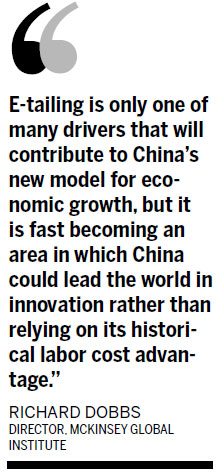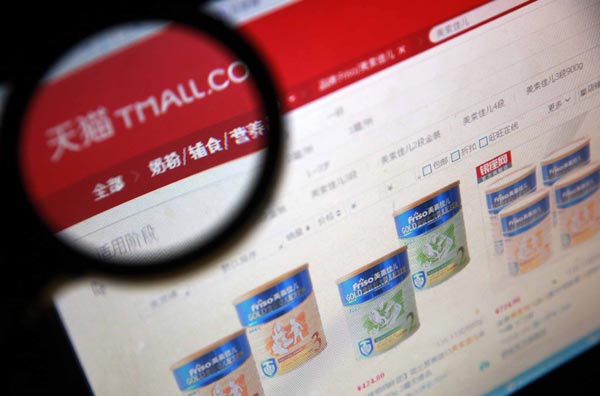E-commerce takes a big toll
Updated: 2013-04-08 07:57
By Wei Tian (China Daily)
|
|||||||||||
|
The annual spending of every online shopper averaged 6,819 yuan ($1,098) in first-tier cities, accounting for 18 percent of the person's total disposable income, according to a report by McKinsey Global Institute. Provided to China Daily |
 |
Cyber shopping has potential to change urban landscape: Experts
China's fast-growing e-tailing market could help unleash private consumption and drive the next stage of economic development, with more opportunities lying in less-developed areas where physical stores are expanding too slowly to meet demand.
Millions of consumers can now log on and purchase goods they could only dream of acquiring just a few years ago. With $190 billion to $210 billion in sales, China came very close to equaling the United States as the world's largest e-tailing market in 2012.
As the size of China's big-spending class continues to expand, the country's e-tailing market may reach $420 billion to $650 billion in sales by 2020, equaling the size of today's United States, Japanese, UK, German and French markets combined, according to a report by McKinsey Global Institute, the research arm of global management consulting firm McKinsey & Co.
"By then, China's e-tailing market will rise to 15 to 20 percent of the country's total retail sales of social consumer goods, up from the currently level of 5 to 6 percent," said Chen Yougang, an MGI partner and one of the authors of the report.
The report found the e-tailing market, which encompasses online sales to consumers by merchants of all sizes, is already having an incremental effect on private purchasing.
"Online shopping has a clear incremental effect on overall consumption and could raise private consumption by an extra 4 to 7 percent by 2020," Chen said.
Cyber space is not just a replacement channel for purchases that would otherwise take place offline. Nearly half of every dollar spent online represents incremental consumption, based on an analysis of data covering 266 cities in China.
This effect is even more profound in China's small and medium-sized urban areas, which generally lack compelling brick-and-mortar retailers, according to the report.
At the moment, cities with relatively high online shopper penetration include Changsha, Guilin and Jiujiang, which are inland cities tending to have relatively lower per capita consumption.
The yearly spending of each online shopper was 6,819 yuan ($1,098) in first-tier cities, accounting for 18 percent of total disposable income.
Today's Top News
Police continue manhunt for 2nd bombing suspect
H7N9 flu transmission studied
8% growth predicted for Q2
Nuke reactor gets foreign contract
First couple on Time's list of most influential
'Green' awareness levels drop in Beijing
Palace Museum spruces up
Trading channels 'need to broaden'
Hot Topics
Lunar probe , China growth forecasts, Emission rules get tougher, China seen through 'colored lens', International board,
Editor's Picks

|

|

|

|

|

|






